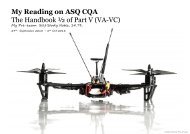My Reading on ASQ CQA HB Part III
You also want an ePaper? Increase the reach of your titles
YUMPU automatically turns print PDFs into web optimized ePapers that Google loves.
<strong>Part</strong> <strong>III</strong>F2<br />
3. Stages Of Team Development<br />
Teams are said to progress through a development cycle. The development stages are identified as forming,<br />
storming, norming, and performing The stages were developed for cross- functi<strong>on</strong>al teams with a specific<br />
purpose and the l<strong>on</strong>g- term project team, but they can also be used for the audit team, which is ad hoc. Figure<br />
15.1 dem<strong>on</strong>strates the usual progressi<strong>on</strong> of a team developmental cycle.<br />
1. Forming: The team is first organized and members are welcomed. There is a certain amount of distrust,<br />
and team members push their own ideas. This is the time the team gets organized (purpose, team<br />
member roles, objectives, and so <strong>on</strong>).<br />
2. Storming: Storming is related to rushing around, attacking, and moving impetuously. Individual team<br />
members attempt to win over others to support their view or to test authority or the legitimacy of the team.<br />
As the team members start to interact and the resp<strong>on</strong>sibility they have been given sinks in, they may<br />
become testy to see if management is committed and if management supports the team and its objectives.<br />
3. Norming: Although norming is not a word, the intent is that members start accepting the team rules and<br />
guidelines and start cooperating. Accepting would be a good word to replace norming.<br />
4. Performing: The team is cohesive and has worked out team issues. The members trust each other and<br />
build <strong>on</strong> team member strengths. The team has matured, has worked through the individual and turf<br />
issues, and is able to achieve objectives. If the basis for the team (goals, support, and purpose) changes,<br />
the team dynamics can slide back to forming or storming.<br />
Most audit teams start at the performing stage. <strong>Part</strong> of the reas<strong>on</strong> for training and providing competent auditors<br />
is that teams can be formed as needed to c<strong>on</strong>duct an audit. Auditors have been trained and understand the<br />
need to work together to achieve the audit objectives from the very beginning. Plus, auditors spend much of<br />
their time operating independently of the team, and the durati<strong>on</strong> of audit team activities and interacti<strong>on</strong> is short.<br />
Charlie Ch<strong>on</strong>g/ Fi<strong>on</strong> Zhang

















